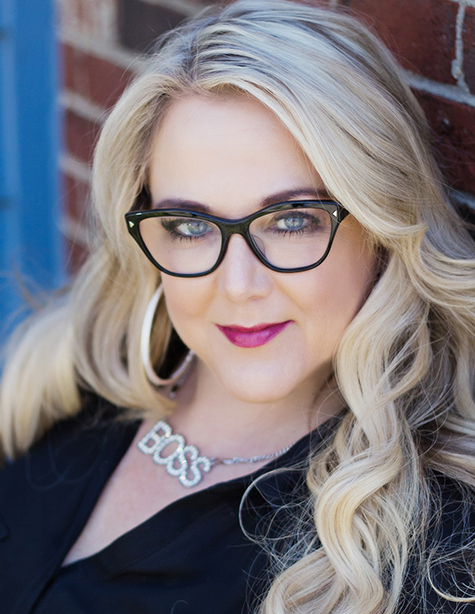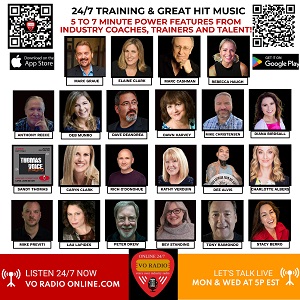|
DIGITAL VOICE WORK How To Protect Your Voice Over Income & Rights In Digital Voice (AI - Artificial Intelligence) Work  By Anne Ganguzza By Anne GanguzzaVoice Actor, Coach & Demo Producer It's no secret. Today's voice technology is evolving at a rapid pace - probably even faster than we as voice talent would like to admit. As today's digital voice work (text-to-speech, synthesized voices and AI - artificial intelligence voice dubbing) becomes more advanced, how can we protect our voice rights, our jobs, and our industry?
Here are some strategies and best practices that can help you moving forward. As much as we like to stomp our feet and tell technology and digital voices to "get off our lawn!", there is no stopping the advancement of technology. It's better for your business to evolve along with the technology to stay ahead of the curve. Right now, digital voice licensing and usage are in their infancy stages of being defined and standardized. And who better to help define them, than YOU? This is your chance to get in on the ground floor to add your voice and specify the terms that work for your business. I won't mince words here. A company that uses your voice may not always be knowledgeable (or even care) about traditional voice licensing when it comes to these newer technologies. Case in point - the most recent news of voice actor Bev Standing vs. media giant TikTok. Just like we should do in our own businesses, companies are looking at their bottom line to be efficient and profitable. So don't feel intimidated when setting your terms and pricing for the work you do for them. You need to value your work as a business to compete and thrive. COVERING YOUR ASSETS Traditionally, our industry has established two types of fees when it comes to pricing work.
A session fee is the compensation that a voice actor receives for the time it takes to record the script for the client. Regardless of whether it is client-directed or self-directed, this fee covers the time the actor spends in the booth on mic. For example, if you are given a script and the client estimates it will take two hours to record, they would book you for two hours regardless if you went to a recording studio or recorded from your home studio. Session fees can vary widely, depending on what the actor decides is their hourly rate. You should always include a session fee in your price quotes. NEXT, HOW AND WHERE A usage fee is a payment that is based on how the client will use your work. It is time-based, meaning you get compensated for the specific amount of time the client uses your VO. It would be prudent to stay far away from any terms that state "in perpetuity" (meaning "forever"), if possible. Even if the price seems like a great deal, and it might be convenient for the client - beware. You will have no control over where or how (or how much) your voice is used. You are in essence signing away your rights to your own voice, literally. You are giving the client carte-blanche to be able to use your voice however they see fit. This includes the possibility of your voice being sold to an AI dubbing company to use in their text-to-speech software, and not having control over the content your voice uses. Usage also specifies where the client is going to use your voice, for example:
Some companies will refer to these fees as "licensing" fees or as a "buy-out". Typically the larger the audience, the larger the fee. Now, since the digital voice revolution, we need to also consider that our voices may also be used on voice devices (think Amazon, Google and Samsung) and the apps that run on them. NEGOTIATING USAGE FEES Usage is typically negotiated based on many layers and can be complex. It may be tempting to take a one-size-fitsall approach, or even consider a full buy-out in perpetuity offer, but if your voice will be broadcast commercially, it makes it even more important to consider usage and fair compensation. With new mediums and formats popping up daily, every voice actor needs to pay attention and be vigilant regarding their voice rights and subsequent usage. This - especially - includes those new to the industry! Just as in traditional voice contracts, you want to make sure that your session time and usage fees are clear and covered when doing digital voice work. PROTECT YOUR RIGHTS In these early stages of the Voice and AI game, it is wise to keep your eyes open. If you see an audition or do a job with specs to record hundreds of sentences with words that don't make sense - or even if they do, this should raise a flag that it may be a possible TTS (text-to-speech) job or an AI dub. Consulting with your agent or a lawyer at this point can be very beneficial, especially if a contract is involved. An agent has more than likely already clarified usage with the client and reviewed any contracts (or had a lawyer on staff review the terms) prior to sending them to you. If you are a member of the union, you should have ample resources there that can help you with any questions. Make sure that the terms are clear about where your voice is being used, for how long, and if there will be any resale, i.e. commercial resale or repurposing of your digital voice. Remember the story of the voice of Siri? The TTS company this voice actor worked for sold her voice files to Apple without her knowledge. She then became the voice of Siri on millions of devices for years without any additional compensation. WHAT HAPPENS IF ... On that note, it may also be important to specify terms as to what will happen to your data if the original purchaser is bought out or absorbed by another company, or in the event that they go out of business. You also might want want to consider adding a term that specifies the deletion of all of your data should you choose to terminate your contract for any reason. If your voice is used for the generation of an AI voice, and, if used commercially - meaning it is resold - you will optimally want to retain the rights to your own voice and give explicit permission as to where and how it may be used, along with an agreement of compensation. This includes all types of jobs that are paid, both broadcast and non-broadcast. Consider the possibility that a buyer may want the exclusivity of your AI voice with their brand, and price your work accordingly. Remember that you have every right to mark up a contract with your own terms prior to signing it. In a perfect world, we would purchase our own AI voices, own them outright, and resell them ourselves! #inapefectworld #vogoals WHO OWNS WHAT? Because this is new territory for all of us, I strongly recommend having a lawyer involved in the process, if possible. Consider it an investment in your future. And speaking of lawyers, according to VO attorney Rob Sciglimpaglia in my latest AI and Voice: Legal podcast episode, if you did not sign a contract and you recorded files for a TTS job in your own home studio, you own the copyrights to all of your files (which is always a good thing). Keep in mind that the prompts recorded for a TTS job from "back in the day" and being used for another job are not the same as having an AI voice generated from those prompts. Creating an AI voice is a much costlier and involved process, and the potential danger is that these voices can say anything the user wants, including words that were never even recorded. This can lead to spots created without your knowledge, spots that are off-brand, and it may even prohibit you from getting additional work if the voice is used for a brand that wants exclusivity, or competes with any brands that you have already voiced for. AI REPLACING LOWER-END WORK Unfortunately, we are experiencing a massive influx of new and inexperienced voice talent that is willing to work for far lower-than-industry-standard rates. This trend has been on the rise for the past 5 to 10 years. Here's a quick reality check: AI text-to-speech dubbing will more than likely find a foothold by replacing its equivalent - the less expensive and less experienced voice actor. That is its strength. So if that describes you - you might want to up your game with some additional training! AI won't be able to replace the voice actor who can find subtext, tell a story, be directed, and create a sense of empathy in their reads. So make sure you are constantly striving to provide a product that the market is demanding - one that is completely human, awesome, and unique. And while you are at it, maybe ... just maybe, you will consider owning and licensing your own AI voice some day too! :) NEW VOICE STANDARDS As these technologies advance, new organizations, such as the Open Voice Network, are being formed to help set the development of standards and ethical usage guidelines to include trust, choice, inclusivity and openness. Also under development, in the EU, is the Proposed AI Act for Europe, which would set rules and regulations for companies that produce AI solutions. This law would help manage risks relating to AI technologies. Specifically, risks relating to fundamental rights - what you would call constitutional rights or civil liberties of people, and the rule of law. If enacted, this Act will affect the tech giants Google, Facebook, Microsoft, Amazon and IBM, as they are globally based doing business with the EU. "I think any tech company, which has a responsible attitude toward innovation and engineering, also has a responsible attitude to the safety of their products, and a responsible attitude toward democracy functioning well, and to fundamental rights of people being respected," says Paul Nemitz, Principal Adviser on Justice Policy for the European Commission, in reference to the proposed AI Act. Some have criticized that this Act could regulate the industry too much, and impede the progress of important new technological developments. But I personally like to think of this as an important first step in helping to protect the integrity and rights of people who are involved in voice technologies, including voice actors. I also believe we will need even more specific state and federal legislation to help protect our rights and to ensure we can get the fair compensation we deserve for our voices. YOU ARE WORTH MORE It's tempting to simply bypass the complicated issues of digital voices and take the easy path to a few dollars. But you are worth So. Much. More. There is work to be done. I encourage you to look toward the future and help us to create a voice over industry in which we can all thrive. We ALL have digital voice rights. Let's make sure our voices are heard! ---------------------- ABOUT ANNE Anne
Ganguzza is a full-time voice talent and award-winning director and
producer who works with students to develop their voice over and
business skills - including VO demo training and production. She
specializes in Conversational Commercial and Narration styles, including
Corporate, E-Learning, Technology, Healthcare - Medical, Telephony, and
On-Hold. Located in Orange County, CA, Anne offers private coaching and
mentoring services to students in person and via Skype, ipDTL or Zoom. Email: anne@anneganguzza.com Web: www.AnneGanguzza.com |
|
|
Tell Us What YOU Think!
Please Note: Since we check for spam, there will be a slight delay in the actual posting of your comment.
Comments
No comments have been posted yet. Hurry, and you could be the first!




.png)



.gif)

click for new article alerts